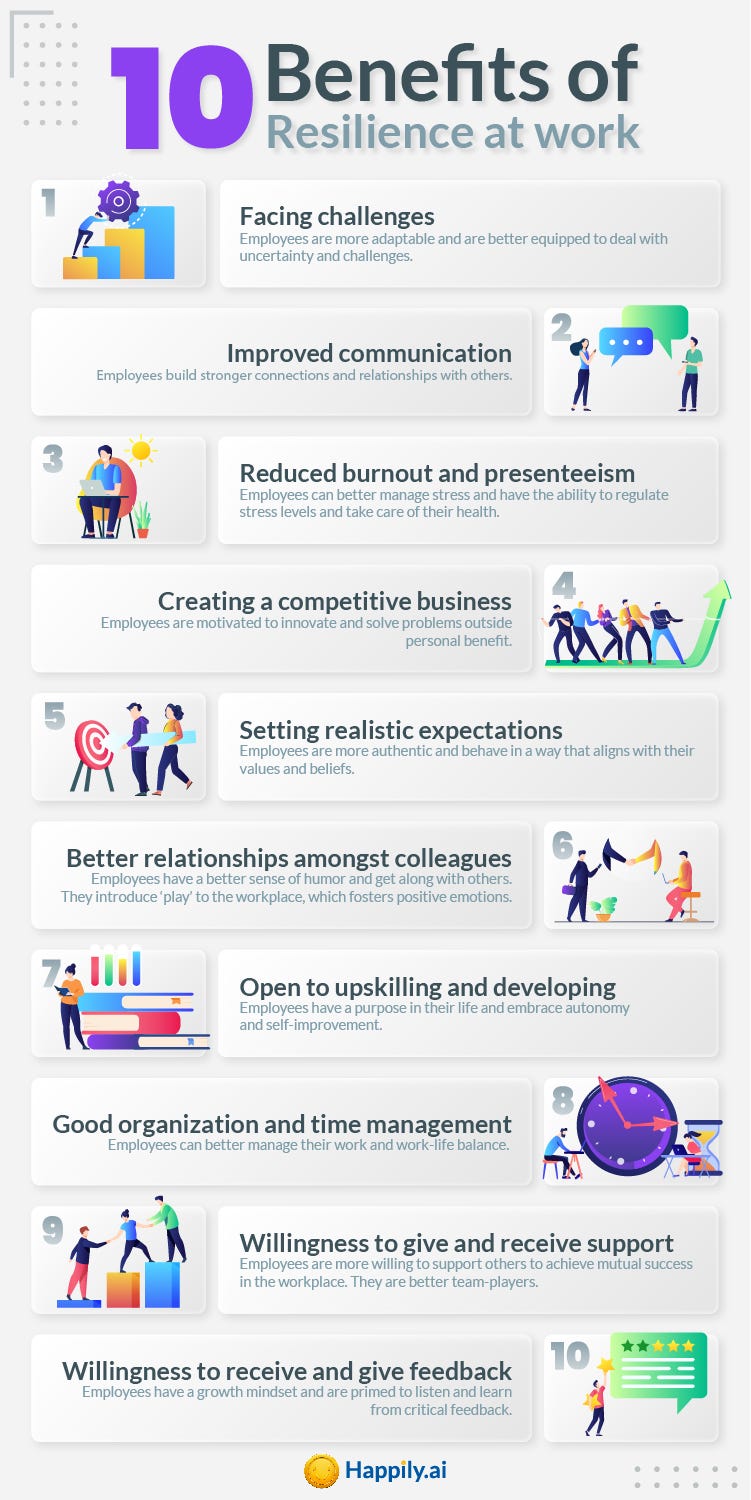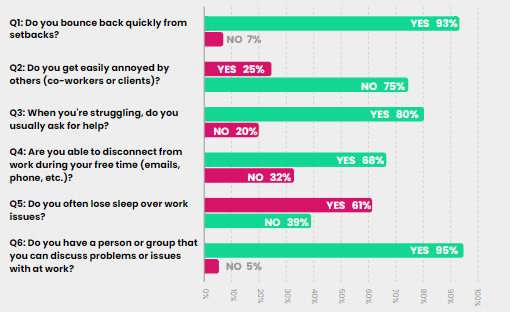Studies show that companies with daily check-ins and continuous feedback (using Happily) exhibit high resilience during the pandemic, although most employees often lose sleep over work issues.
Resilience in the workplace
“Resilience is knowing that you are the only one that has the power and the responsibility to pick yourself up.” — Mary Holloway.
What is resilience?
Moments of crisis, like a global pandemic, bring significant changes to our lives and environment. Resilience plays a vital role in our ability to overcome overwhelming challenges.
Resilience is our ability to “bounce back,” getting back up after we face disappointment and failure, and what helps people recover from setbacks [1]. According to the American Psychological Association (APA) Help Center, it’s “the process of adapting well in the face of adversity, trauma, tragedy, threats or significant sources of stress” (APA, n.d.).
Why is resilience important in the workplace?
A UK Job Board study revealed that 57% of employers see resilience as a critical skill for candidates.
Resilience enables a positive approach to work and perspective on life, allowing better problem-solving and maintaining motivation [3]. Resilient employees are more motivated, capable of dealing with changes, less susceptible to burnout, and healthier. Resilience and wellbeing in the workplace are closely linked.
Tugade and Fredrickson (2004) found that “the psychological mindset involved with resilience is reflected in the body as well” [4]. Joshua Miles, a therapist, adds that resilience is related to lower absences from work due to sickness (absenteeism) and reduced risk-taking behaviors, including excessive drinking, smoking, and drug use. It’s connected to a lower rate of mortality and increased physical health (2015).
The many benefits that resilience brings to the workplace [3], [4] are shown below:

Our Study & Results
To study resilience in the workplace during the COVID-19 pandemic, Happily’s pulse survey (daily check-ins) collected feedback from 1,500 respondents across ten companies with the following questions:
Q1: Do you bounce back quickly from setbacks?
Q2: Do you get easily annoyed by others (co-workers or clients)?
Q3: When you’re struggling, do you usually ask for help?
Q4: Are you able to disconnect from work during your free time (emails, phone, etc.)?
Q5: Do you often lose sleep over work issues?
Q6: Do you have a person or group that you can discuss problems or issues with at work?
The results from the six introspection questions are showcased below:

The highlights from the results are that:
- Most employees (61%) often lose sleep over work issues.
- One in four (25%) employees get easily annoyed by others (co-workers or clients).
- One in five (20%) of employees usually do not ask for help when they are struggling.
- A majority of employees (68%) can disconnect from work during their free time (emails, phones, etc.).
- Overall, employees are resilient at work. Most (93%) of the respondents can bounce back quickly from setbacks and (95%) have a person or group to discuss problems or issues with at work.
The HR and Development team was looking for a platform that would help them understand employees in real-time, facilitate feedback, and provide insights and reporting that enhances their workflow and people processes. Their main challenge was the generation gap in the company; management struggled to understand what can or would motivate junior level employees to perform better.
After working with Happily, here are some of the results they observed: a) 89% participation rate for peer-to-peer recognition - team members more open to give appreciation and praise for job well done.
b) Encouraged a healthier lifestyle - a combined total of +450,000 km achieved in the Running Track
“The app has good potential for creating more feedback loops between staff and also to highlight who's good at what, etc. and I feel this can be utilized more. The biggest positive side to me is definitely that we're seeing a lot more recognition of other's work, which is great." - Comment from an Employee at the Marketing Firm
How to build resilience at work
Resilience is not something you’re born with, but it is an ability that can be developed through practice, a growth mindset, and the right environment. To build and foster resilience at work, organizations should [5]:
1. Share clear goals and directions
Leaders should meaningfully set and share clear goals with their teams. Alignment and a sense of purpose provide direction, helping employees overcome obstacles and rebound from setbacks.
2. Have frequent two-way communication
Daily check-ins and weekly 1-on-1 meetings are a great way to maintain alignment, proactively solve problems, and foster a continuous feedback loop across your organization. A healthy and timely back-and-forth is the needed catalyst for new ideas and successful execution (ideas + execution = innovation).
3. Provide a flexible workplace
A flexible work environment helps your employees quickly adjust and respond to changes as needed. The now and future of work is dynamic, and our systems must help, not hinder, our people. Resisting change leads to undue stress.
4. Share a sense of belonging
A sense of belonging is strongly correlated to commitment and motivation, and it helps employees feel authentic and part of something bigger than themselves.
5. Provide barrier-free collaboration
Legacy systems were designed to reduce costs and error while sacrificing speed and adaptability. Barriers to collaboration, experimentation, and adopting new ways of working must be purposefully removed.
6. Support employee well-being
Employees need to be at their best to thrive outside of their comfort-zones, adapt, and take risks. An employee’s capacity is limited when they’re stressed or overwhelmed at work. A supportive environment focusing on well-being can help employees feel secure, valued, and more committed to their organization.
Conclusion
A report by Qualtrics on Resilience [6] found that 74% of employees worldwide rate their indicators of resilience favorably. Organizations using Happily.ai reported 93–95% of employees resilient at work.
During the pandemic and as we approach the new normal, business continuity and resilience are top priorities. Organizations need to adapt and bounce back from unforeseen setbacks; only possible if their people are resilient. Creating the right environment and putting in place the right leadership and practices is critical.
Happily.ai is an all-in-one employee experience platform that fosters a resilient workplace. Organizations use Happily to run daily check-ins, enable better conversations, and develop people managers. And real-time insights help you better understand your teams and people. Visit us on our website or sign up for a demo here!
References:
[1] https://positivepsychology.com/what-is-resilience/
[3] https://www.highspeedtraining.co.uk/hub/resilience-in-the-workplace/
[4] https://positivepsychology.com/resilience-in-the-workplace/
[5] https://www.bluebeyondconsulting.com/2020/08/6-ways-to-build-a-resilient-company-culture/
[6] https://www.qualtrics.com/ebooks-guides/ex-workforce-resilience-study/









